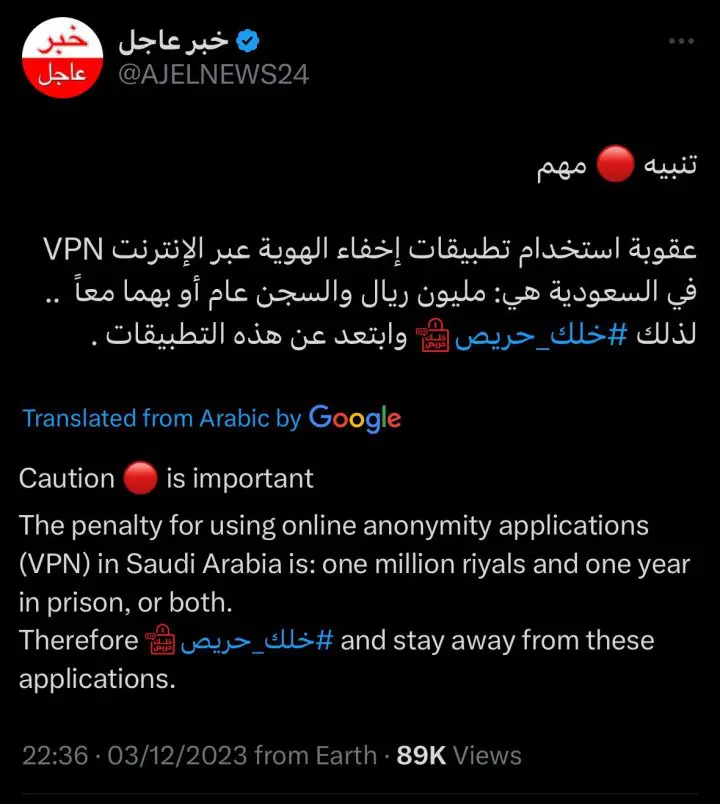I have a question regarding VPN usage in South Korea and Saudi Arabia. I may go for short term work in either South Korea or Saudi for a few months. Does anybody have any idea, how safe it is to use a VPN as a foreigner in these countries? Worse case scenario, can I use a VPN in a Azure VM and scp torrent downloaded files or something?
Do your best to stay away from SA.
No way you’d get into trouble in South Korea. Don’t worry about that. Can’t say much about Saudi Arabia though

just stay away from that shithole SA.
Fuck me… But yeah that was what I was kinda expecting.
Will these work with torrent downloads and such? For regular browsing it will work I guess, but won’t downloads be really really throttled. Please forgive me if I’m asking dumb things.
I’d just play it safe, avoid anything that could remotely be considered “suspicious”.
If you can bring your own media, bring a few offline shows and movies, books or what ever else you like.
Otherwise stick to nonral websites.
VPNs are super common for business reasons. A lot of business travelers are going to use a VPN to access files and services only available on their network.
Using a big VPN might be risky; a self-hosted VPN should be less risky. I’d avoid torrenting though, even legal torrents.
Can you ask your IT department their recommendations?
SK is a non-issue. I personally wouldn’t step foot in SA though. I don’t think they block vpn but they will ruin your day if they think you’re possibly related to a known objector.
SK would only be an issue if you have reason to believe they would be interested in you for some reason.
What if I use a VPN inside a cloud VM and scp the files? Would that raise any flags?
VPN usage is simple to detect. I don’t know how SA deals with it. If it’s like China you may get throttled considerably and “raise flags”
I never had issues with SK but it’s been a minute. I doubt it will be an issue.
How do they detect it?
Are we talking commercial VPN like Nord or Proton? What about something like Tailscale to connect to your home network?
VPN and any other encrypted app traffic has telltale signals. You might not be able to decode the content, but you can see who is talking to who, how often, how long, how much data, etc.
My firewall, Palo Alto, and my dns service, Cisco umbrella, has no problem identifying people using VPNs on my networks.
I wonder if someone could set up some form of tunneling through much more mundane traffic, perhaps even entirely over a legitimate encrypted service through a regular browser interface (like the browser interface for services like Discord or slack or MS Teams or FB Messenger or Zoom or Google Chat/Meet) where you can just literally chat with a bot you’ve set up, and instruct the bot to do things on its end, and then forward the results through file sending in that service. From the outside it should look like encrypted chat with a popular service over that https connection.
Sure, they could block based on your VPN provider, but they’re probably also using Deep Packet Inspection .
The ELI5 verson: It’s possible to just “watch” your traffic and notice that it’s not the “normal” https traffic (which is the most common traffic) . This can be done by finger printing the request itself or just watching the amount of traffic. For example if you “visit” a website, but upload and download 3 megabytes of data and it takes 15 minutes to send/receive that data… well, that looks suspicious… and depending on the country, you may have some people knocking on your door.
Just don’t. Use the time to catch up on your book reading.
This is the best answer. Torrents / possibly illegal downloads are a big no-no in many countries, if you’re truly a movie addict: buy a portable dvd drive and a bunch of movies (2nd hand can be very cheap nowadays). Additional advantage: internet access is still not very good in many places. On VPNs: there are several options, a commercial one like Nord, your company’s (never, ever torrent over your company networks!) or a self hosted. My home router can run ipsec and wireguard services, yours possibly too. DO REMEMBER: VPN traffic is very recognisable, if the local ISP thinks it’s sus, questions may be asked; better be careful.









